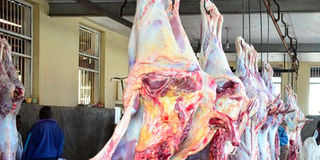EU injects Shs67b in revamping beef industry

EU injects Shs67b in revamping beef industry
What you need to know:
- Much of Uganda’s meat, which is exported goes through informal channels, finding itself in markets such as South Sudan, DR Congo, Burundi and Somalia.
The European Union in partnership with government has injected Shs67.7b in the beef industry with the desire to improve quality in the meat value chain.
The money will help to create a market oriented and environmentally sustainable beef industry in Uganda.
“From production, consumption, through processing, transportation, retailing and the other services which include veterinary, where policy and regulations are all aimed at establishing a solid governance of the meat value chain including environmental sustainability are all integral parts of the chain,” Mr Aloys Lorkeers ,the EU head of section sustainable development said at the launch of the project in Luweero District.
The market –oriented and environmentally sustainable beef industry project will be implemented in 30 districts under a five-year project.
The project will cover the districts Luweero, Nakaseke, Nakasongola, Kiboga, Kyankwazi, Bulisa, Masindi, Mityana, Buliisa and Masindi.
Other include Mbarara, Masaka, Kalungu, Mityana, Kyotera, Ntungamo, Rakai, Gomba, Lyantonde, Kamwenge, Gomba, Kiruhura among other districts.
The project, which brings together all stakeholders including the Ministry of Agriculture, institutional partners and private sector operators seeks to reduce poverty as well as promote inclusive growth in a country where the livestock sub-sector is still faced with poor genetic resource utilisation, limited availability of quality feeds, poor husbandry practices, and scarcity of water, weak policy and regulatory framework.
“This is the very reason why we need to lay a firm foundation for the beef industry,” the State Minister for Animal Industry Ms Joy Kabatsi said.
Currently, meat from Uganda is not allowed on the international market since the production does not comply with international sanitary and animal health standards.
Timely intervention
Informal channels: Much of Uganda’s meat, which is exported goes through informal channels, finding itself in markets such as South Sudan, DR Congo, Burundi and Somalia. Therefore, the timely intervention, according to Kabatsi must be supported as one of the comprehensive plan to ensure the success of the meat sector.




